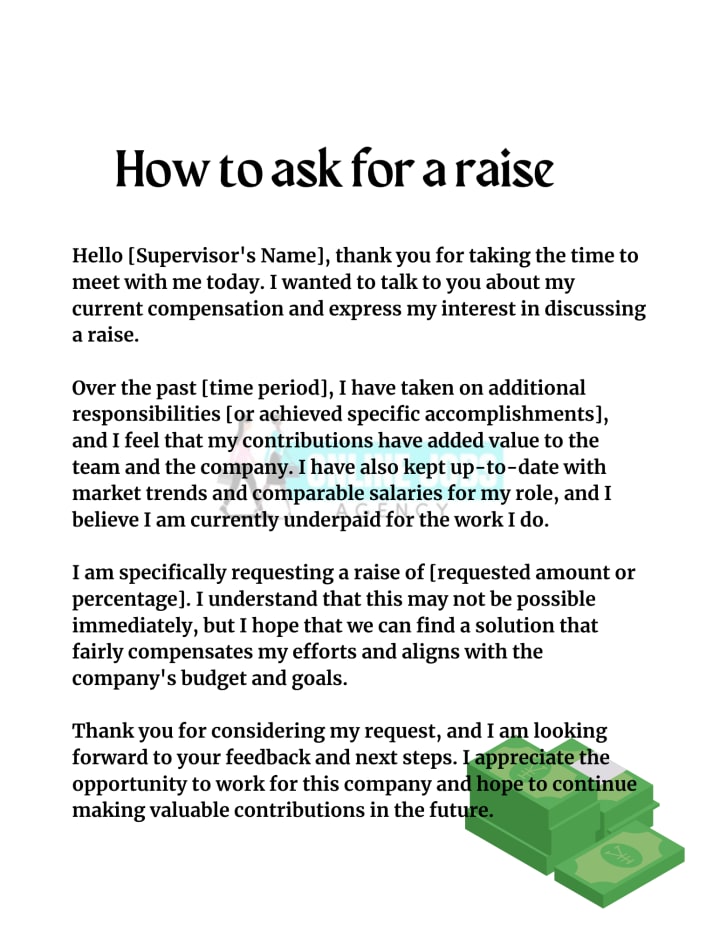How to ask your employer for a raise
To ask for a raise, do research on the current market rate for someone with your experience and qualifications using websites like ojaint.com and PayScale. Know your current salary and what your peers are making. Consider how much you've grown professionally, your company performance, how often raises are given, and how long you've been at the company. Create a formal proposal with reasons why you deserve a raise, and use facts and figures to support your case. It's important to consider the right timing and approach when asking for a raise.

It's not uncommon for people to feel like their salary isn't high enough. The good news is that it's a lot easier to ask your employer for a raise than you might think. By doing the research, practicing and learning from others who have gotten raises at your workplace, you can ensure that you have the best possible chance of getting one yourself!
Research the current market rate.
The next step is to do some research. You want to be able to show your employer that you know what the market rate for someone with your experience and qualifications is, so it's important that you're armed with this information when asking for a raise. Here are some places where you can find salary data:
- Online Jobs Agency (https://ojaint.com/) has a database of user-generated salary information from employees who have anonymously shared their compensation details. It's completely free, but keep in mind that not everyone will share their exact figures--or even give an accurate range--so take everything with a grain of salt! If there are many people working at your company or industry though, this could still be useful information because they might indicate trends regarding pay increases over time or across industries/locations etcetera.
- PayScale (www.payscale.com) provides free salary reports based on real-world data rather than surveys alone; however these aren't updated regularly enough yet so make sure not only check out other sources first before relying solely on them!
Find out your current salary.
How much are you making?
- Find out what your peers are making. You might be surprised to find that your salary is lower than it could be, especially if there's no good reason for it. For example, if everyone else in your department has had raises and promotions over the past year but not you, it makes sense to ask if there's a reason why. If they tell you there isn't one--and this could be because they want to make sure that everyone has an equal chance at advancement within their organization--it might be time for another conversation about how much money they would need from their company before agreeing on a raise with them.
- Look at salary surveys online or talk with friends who work in similar fields as yours (or even just coworkers) so that when discussing salaries with potential employers later on during interviews or job applications, these numbers will already be familiar ones rather than having come out of nowhere!
Look at how much you've grown professionally.
If you've taken on more responsibilities at work, that's a good reason to ask for a raise. The same goes if you are responsible for more people and/or have assumed a new role in your company. If your company has given you opportunities to grow professionally, then this is also worth considering when making your case for why now is the time to get paid more money.
If you're a new employee, it's reasonable to ask for a raise after your first year on the job. If you've been around longer than that, though, waiting until your anniversary date may not be the best approach. It may be more effective to bring up the issue when there is something specific that has happened at work that merits a pay increase.
Consider company performance.
When considering the company's performance, think about what has happened over the last year or so. Have they had any major successes? If so, that should be a reason for you to ask for a raise. Conversely, if they've had some setbacks recently and aren't doing as well as they could be doing--or worse yet, if they're in financial trouble--you may want to hold off on requesting an increase until things improve again.
It can be helpful to look at revenue growth or profit margins when considering how much money your employer is making or losing over time. If there has been steady growth over several quarters (or years), then it might be worth asking for more money from them because you'll likely have more value added than someone who wasn't part of those positive changes!
Consider how often raises are given at your company.
When you're considering whether or not to ask for a raise, it's helpful to know how often raises are given at your company. Some companies give annual increases, while others give them every two years or even less frequently. Sometimes raises are tied to the amount of experience and expertise employees have gained (for example: when they reach a certain level), while other times they may be tied to the financial performance of the company.
If you feel confident that your work merits an increase in pay but want to make sure there isn't another reason why this might not be possible right now (such as low profits), then consider speaking with someone who knows how things operate at your organization before approaching HR about it directly.
Think about how long you've been at the company.
Before you approach your boss, think about how long you've been at the company. How long have you been in your current role? And how long have you been doing the work that contributed to your raise?
If it's been more than two years since joining and three years since moving into a new position within their company, chances are good that it will be difficult for them to say no on principle alone. They may also be impressed with how much progress has been made since then--and even if they aren't completely sold on giving an increase yet, this could help get things started in the right direction!
Create a formal proposal.
The first step in the process is to create a list of reasons why you deserve a raise. Use facts and figures to support your case, but don't get bogged down in details. It's better to keep it short and sweet, because the more information you present, the more likely it is that someone else will see through your logic (or lack thereof). Be specific about what kind of raise you want--and how much!
Be realistic about what kind of response from management is likely considering their current budget situation, as well as their financial priorities for other projects or initiatives at this time.
Here is a sample script you can consider:

This was also posted on Online Jobs Agency's official tiktok page, see the below:
Practice your ask before meeting with your boss.
- Practice in front of a mirror, or in front of one or more friends or family members.
- Write it down on paper so that you can see what you are saying and make sure it makes sense to others as well. It's important to be able to explain why you deserve the raise, and this is an opportunity for self-reflection about how much value you add to the company each day at work (or how much money they could save if they let go of their most valuable employee). The more prepared you are for this conversation, the better off everyone will be!
The most important thing to remember is that the boss needs to see that you are valuable. You need to show that you can add value in some way, or perhaps this is a good opportunity for a change in responsibilities. If you want to get a raise, make sure that your boss knows how much value you bring to the company each day at work.
The second most important thing to remember is that you want to get a raise as soon as possible. You don’t want to wait until your boss offers one because chances are they won’t unless they are pressed for time, or they just feel like doing it out of kindness.
You can get a raise by doing research, practicing and learning from others who have gotten raises at your workplace.
Visit the company website and search for "salary guidelines."
Look at Online Jobs Agency, a website that allows employees to anonymously review their companies and co-workers. This will give you an idea of how much other people in similar positions make at your workplace.
Talk to friends who work at other companies to see what they make, or ask them if they know anyone who works at yours (and ask them not to tell anyone).
If you work in a small company and can’t find any information about salary guidelines, ask your manager for an internal job posting for someone with your qualifications. This will give you a rough idea of how much other people at the company make.
Conclusion
Getting a raise is a big deal, and it can be stressful to ask for one. But if you're prepared and know what factors matter most in your company's culture, then you'll feel confident as you present your case. The most important thing is to be honest with yourself about what makes sense for your career trajectory at this point in time--and then make sure that it comes across clearly when speaking with HR or other managers about why this raise would benefit them too!

About the Creator
Courtanae Heslop
Courtanae Heslop is a multi-genre writer and business owner.






Comments
There are no comments for this story
Be the first to respond and start the conversation.